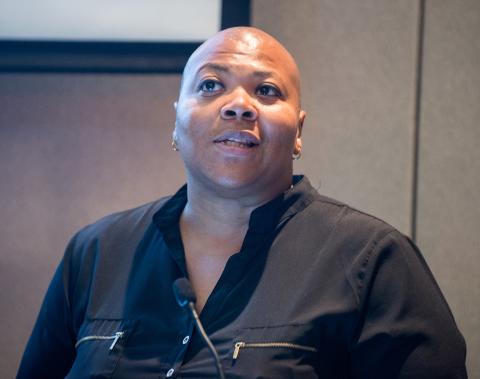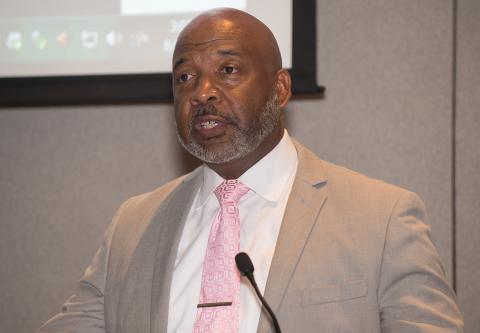Pride Event Addresses Sexual and Gender Minority Issues

Photo: Leslie Kossoff
This year is the 50th anniversary of the Stonewall riots in New York City that triggered a demand for recognition and acceptance in mainstream society by the LGBTQ community. Because of that, this year’s Pride Month was special in many ways, not just for the community at NIH, but also globally.
“It became one of the most satisfying experiences,” Dr. Sharon Milgram, director of the Office of Intramural Training and Education, said of the NIH Academy Enrichment Program (NAEP) that she and Dr. Shauna Clark started. It was designed to bring under its wings gifted trainees from marginalized communities. Bali White, a prominent product of the NAEP and now strategist for the sexual & gender minority (SGM) portfolio in the Office of Equity, Diversity and Inclusion (EDI), opened NIH’s Pride in Diversity 2019 SGM Community & Ally Leader Awards Program held June 20 in balcony C of the Natcher Conference Center.
“The honest truth is that many LGBT youth are still bullied and the data on attempted suicide, suicide ideation, actual suicide and homelessness in the LGBT young community is staggeringly painful,” Milgram said. Her mission as OITE director is to assure that trainees from different backgrounds feel comfortable and included while pursuing research at NIH. Along with her team, Milgram works diligently to ensure that gender and sexual orientation don’t stand as roadblocks for any trainee here.

Photo: Leslie Kossoff
However, social acceptance of the LGBTQ community hasn’t always been what it is today. This is true both inside and outside NIH. For much of her talk, Milgram told the story of her own coming out. Hailing from an Orthodox Jewish community, Milgram said it took her many years to be proud of who she is. This experience has shaped the way she handles her responsibilities as counsel for anyone having trouble assimilating in their society and workplace.
“I still come out, and I think that is one stress that can be hard for people to understand about the LGBT community—the debate of do I come out or do I not come out,” Milgram said, giving an example of one of the many dilemmas facing people of this community.
She underscored what many early-career researchers feel about science: that it is not a healthy place to be; that there is discrimination based on gender, color and, of course, sexual orientation.

Photo: Leslie Kossoff
“Lots of women tell stories about harassment in science, and I have my own,” Milgram said. “We’re always saying ‘well, we just have to persevere for the science’ as opposed to ‘we should be mad as hell’ and do something about this.” She cited a study demonstrating higher exits from STEM careers in LGBTQ people.
This year’s Pride program honored change agents. “These are everyday folks who are doing small things that have significant impact,” said Dr. Rashada Alexander, member of EDI’s SGM engagement committee. “Their presence gives shape to the environment in which we work. They are the risk-takers and visionaries who see possibilities when the rest of us sometimes see obstacles.”
Receiving awards were:
- Tricia Coffey, chief of hospital information management at the Clinical Center, for her work in creating a more inclusive and diverse patient experience in the SGM community.
- Dr. Christopher Wheldon, cancer prevention fellow at NCI, for studying the unique health issues in SGM communities and for his interventions to enhance quality of life and health outcomes in these populations.
- Dr. Karen Parker, director of NIH’s Sexual & Gender Minority Research Office, for the support she provides to researchers involved in working on SGM issues.
- Gabriela Zabala-Aleman, detailee at OITE, for advocacy and mentorship in the SGM community.
- Dr. Vivian Ota Wang, deputy director of NCI’s Office of Data Sharing, for her research and expertise in race, sex and gender issues.
- Dr. Victoria Cargill, former associate director for interdisciplinary research at the Office of Research on Women’s Health, for her contributions while she was at NIH.

Photo: Leslie Kossoff
“I think it’s a good way for us to live, to take pride in who we are and our personal story,” concluded Danny Dickerson, EDI’s director of diversity and inclusion.
